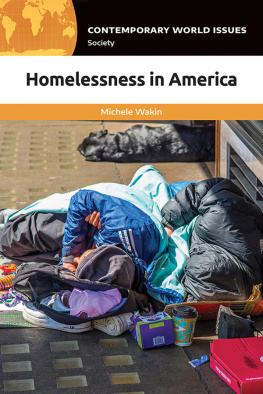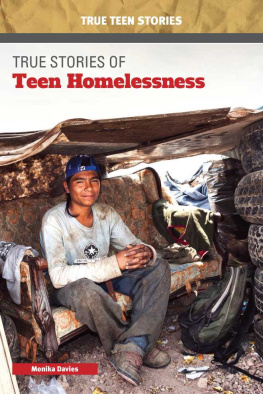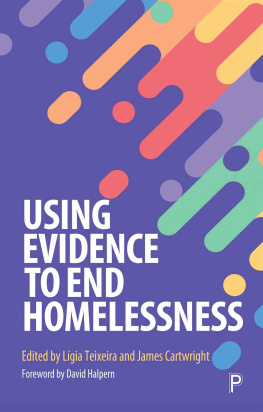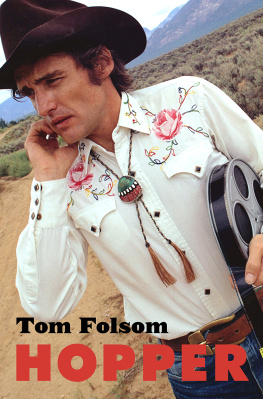Acknowledgments
To tell a tale of homelessness in his latest novel (King: A Street Story), John Berger resorts to the voice of a shanty-town dog. While this book has no key informant quite so strategically placed, it has amassed (more than) its share of debts. With apologies for grouping peaceably in print what would (in some cases) be fracas in practice, my thanks to the following:
To my comrades-in-arms at the outset of this errantry: Ellen Baxter, Robert Hayes and Stuart Cox, the Fathers John (Duffell, Felice, and McVean), Diane Sonde, and David Beseda.
To Sue Estroff, Shirley Lindenbaum, Katherine Newman, and Roger Sanjek, who early on spied something resembling anthropology in my field dispatches and encouraged its cultivation. To the late Elliot Liebow, for showing this upstart an elders esteem. To Jim Baumohl, for policing my syntax, playing wrangler to my unruly arguments, and collaborating on God knows how many drafts of joint undertakings.
To the advocates at the New York and National Coalitions for the Homeless, and the National Law Center on Homelessness and Poverty, for insisting that what passes for a line item on a budget these days remains a scandal nonetheless.
To government officials who ignored the clove of garlic around my neck and, not without misgivings of their own, admitted me to the outer reaches of the inner circles of policy making and report writing.
But this is, after all is said and done, a book. For critical comments on earlier drafts of chapters, I owe huge thanks to: Mireille Abelin, Joan Alker, Martha Are, Steve Banks, Sue Barrow, Jim Baumohl, Gary Blasi, Mary Brosnahan, Marti Burt, Frank Caro, Jack Doyle, David Giffen, Kostas Gounis, Marg Hainer, Jill Hamberg, Chester Hartman, Mary Ellen Hombs, Fred Kamas, Ken Kusmer, Gene Laska, Anne Libby, Margaret Lock, Anne Lovell, Maryse Marpsat, Elizabeth Martin, Michael Meyer, Deborah Padgett, Debra Rog, Peter Rossi, David Rothman, Roger Sanjek, Diana Silver, Luisa Stark, Norma Ware. For access to unpublished historical material, I want to acknowledge the keepers of the Stuart A. Rice Archives (at the Harry S. Truman Library, Independence, Missouri) and the Community Service Society Archives (Columbia University, New York). For assistance in preparing the manuscript, thanks to Donna Brophy and Caitlin McMahon. And on the editorial front, may I salute the discerning eye and deft hand of Cathi Reinfelder.
Last and forever, it would have been a different book (and a vastly different life) were it not for Nancy and Jude, who took in a wayfarer and restored his sense of home.
While working on this project, Ive received support from the Ittleson Family Fund, the Woodrow Wilson Foundation, the Charles H. Revson Foundation, and the National Institutes for Mental Health, for which Im grateful. Half the authors proceeds from the sale of this book will go to support the work of The Jazz Musicians Emergency Fund (800-432-5267; jazzfoundation.org).
A note on the photographs:
The historical pictures of the Municipal Lodging House come from the Municipal Archives, courtesy of Edwin A. Brown (Broke: The Man Without The Dime, 1913). The shots from the early 1980s (all taken by the author) are more problematic. Images of the streetdwelling homeless not only illustrate but also, ineluctably, participate in that spectacle of the degraded pauper that has been a mainstay of American relief policy. They appear here as a necessary part of the record.
[1]
This Business of Taking Stock
It must be some kind of experiment or something, to see how long people can live without food, without shelter, without security.
Homeless woman, Grand Central Station, winter 1980
As introductions to homelessness go, mine as a newly arrived graduate student in New York in 1972 was hardly traumatic. But it was an uneasy mix of the grim, the wrenching, and the comic. There were, first of all, those inescapable images of the citys forsaken: the half-naked man cavorting in the steam pouring out of vents at a street construction site early one morning, wraithlike in the glow of mercury-vapor lights; the sobbing figure of a woman sitting on the stone steps of a church, the still body of a man lying prone on a sidewalk, the plaintive importuning of a beggar at the subway turnstileeach studiously ignored by passersby. There was even then the wandering army of men and women given to animated, sometimes agitated, conversations with unseen companions in what sounded like a pidgin of obscene and foreign tongues. I had recently finished a six-month stint as a psychiatric aide on an acute ward and my initial reaction was that I knew these people, or had known them in a former life as patients. In a city that was centuries away from a subsistence economy, it seemed incredible that they belonged nowhere, had no refuge however mean to retreat to, and were the responsibility, apparently, of no surrogate protector.
Scruffy enough in my own attire, I was occasionally taken for a fellow traveler. Leafing through a translation of Virgils Aeniad on the used books stand at the old Salters Bookstore across from Columbia University, I was joined one day by one of the Upper West Sides regulars. Reading over my shoulder, he pronounced the translation sound. I replied, in a perverse moment of pride at having endured three years of high school Latin, that while it was a serviceable job, the original was so much more lyricaland then went on to recite (from memory, not sight translation) the opening line of that epic poem: Arma virumque cano, Troiae qui primus ab oram.... My companion was unimpressed: Youre not scanning correctly, he retorted, exasperated, and proceeded to give, in a voice befitting their grandeur, an alternative reading (in Latin) of the poems first ten heroic lines. To my hopelessly outclassed ear, it sounded like the rendition of someone long familiar with the text.
I came, too, to know the limits of tolerance of those who were the unwitting accomplices of a graduate students casual charity. Confronted with the sight of my sharing a table with a large, zanily outfitted womanand her even larger grocery cart of belongingsthe owner of the West End Cafe (who knew me as a regular, all-hours customer) was hard-pressed to let us stay long enough to finish our coffee. After we were thrown out, I did, however, demur at her suggestion that we continue our conversation at my dorm room. I saw her irregularly on the street thereafter, and would remake her acquaintance at a Catholic Worker House of Hospitality a decade later.
Suffice it to say that I, like any half-sentient city dweller of that period, was acquainted with the obvious. I did the requisite tour of the Bowery, visited some of the seedier bars in the Lower East Sides repertoire, and succumbed regularly to the entreaties of panhandlerssome of whom I occasionally queried, only to be fobbed off with (what I was later to learn were) stock responses. A vague resignation, almost an absentmindedness, slowly displaced my initial disorientation. I grew accustomed to random, visible suffering as a routine fact of urban life. I suppose I figured this was part of what acquiring a New Yorkers toughness was all about.















